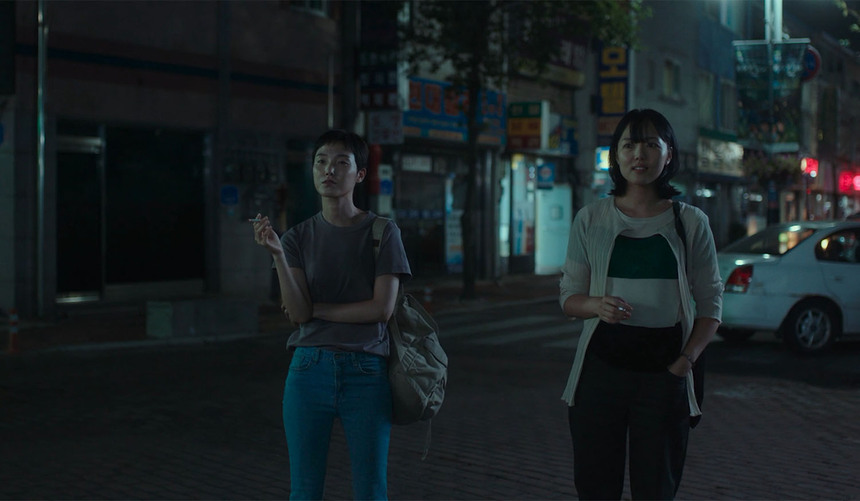Busan 2020 Review: VESTIGE Ponders the Ineffable with Grace and Mystery

Two Korean masters of arthouse cinema join forces for one of Busan's most intriguing offerings this year. Commissioned by the Muju Film Festival, Vestige features two mid-length films from Kim Jong-kwan (Worst Woman) and Jang Kun-jae (A Midsummer's Fantasia), which both deal with death and the afterlife in lyrical and understated ways. Though this light brush with horror is new territory for them, both directors retain elements of their trademark styles, while also hinting at new stylistic directions in their work.
In the first segment by Kim (neither is titled), an eccentric woman wanders around the countryside and an abandoned house. She frantically performs a ritual in the dilapidated home and then, through flashback, we learn that this woman is a shaman and mother to a high school-aged daughter (played by Ahn So-hee, of Kpop outfit Wonder Girls). Her daughter begs permission to adopt a kitten, but she warns her against it, as the animal will meet a grisly end, owing to spirits in the house. As we hear the mother's warnings, we notice the spectre of a young girl looking on from the wall. The question, of course, is who is this apparition? Is it in fact the daughter herself, viewing her past self?
Back in present day, the mother appears tormented and lost. Yet it's not only her that seems off, her very surroundings appear to have been emptied of life. Their modest family home has fallen into disrepair, and wintry trees gnarl and twist around it, as if wresting it from the mortal world. The sky is a frigid blue and the forest and the mountains an earthy brown, as the very color appears to have been bled from this world, save for the warm dots of candlelight which beckon us in one of the film's most visually striking scenes.
Director Kim is known for shorts and features that resemble omnibuses, which are dominated by dialogue sequences between sets of characters. It's a familiar pattern, but one through which his unique sensitively has explored a surprising range of themes and emotions. As such, his segment for Vestige represents a significant stylistic departure, and though his philosophical musings and affecting touch remain, he explores something new and unknowable.
Not everything is clear is Kim's film, which asks us to fill in the gaps and perhaps project our own feelings about death, loss and regret, but the style is rich and evocative. Despite their staid and conversational nature, Kim's works have always featured an impressive visual flair, but Vestige sees him go further, so his greatest tool here is cinematographer Jee Yune-jeong. Jee is responsible for several stunning Korean documentaries, having shot Manshin and Factory Complex, and her deft knack for natural lighting and color is used to terrific effect, particularly through drifting tracking shots that draw us into another world.
By contrast, Jang Kun-jae has embraced long take, two-shot dialogue scenes in the second segment of Vestige. As with his previous films, he introduces us to characters who are forced into pre-determined societal paths, and though they make little attempt to rebel against their stations, the weight of the monotony and frequent unfairness of their courses gradually exact their toll.
Kang Jin-ah, of the criminally under-seen indie To My River (screened at Jeonju in 2018), plays a woman who meets her friend in a dank chicken-and-beer joint one evening. She is a civil servant and trying to encourage her friend, who is attempting the civil service exam one last time after a string of failures. She invites her friend to stay, but she mysteriously disappears. This woman is seeing a nice young man at her office, although her mother doesn't approve of the match, since he is a country bumpkin from Muju (a cheeky jab at the festival that commissioned the film).
Over various meals with these three different people, shared conversations make her consider her position in her own life, what the point of her aspirations are and ultimately what may lay ahead. One evening, as they drink rice wine on the porch, her boyfriend explains how his deceased father appears in his home at night, soundlessly searching for something before repeating the same journey.
At first, Jang's film appears more straightforward and its ruminations, though wide-ranging, are more muted than in the first film. Yet ultimately it's clear why this was selected as the closing segment, as the story's quiet conversations lead to a powerful conclusion, one that achieves catharsis, even as it poses more questions than it answers.
Though compelling, atmospheric and highly accomplished, these segments may not rank near the top of their respective filmmaker's works. However, they serve as fascinating counterpoints to each other as they explore similar questions about mortality and legacy, teasingly stimulating that unscratchable itch: where do we go? Given that Kim and Jang are both working on bigger projects after well over a decade each in the indie realm, Vestige offers a tantalising look at how their own legacies may be shaped in the coming years.







